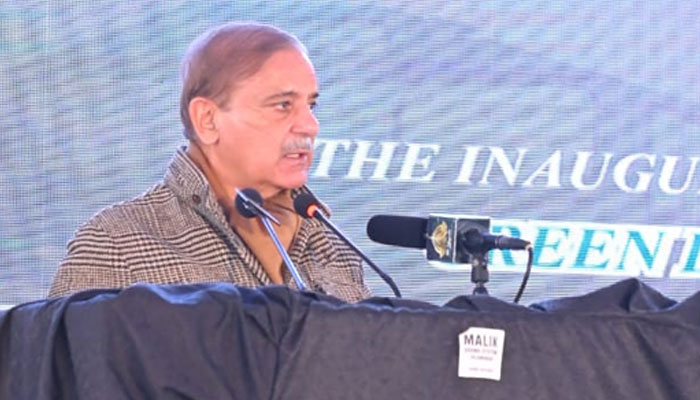Pakistan-IMF deal to be inked this month: PM Shehbaz
PM says govt has prepared a need-based list of items that need to be imported
Prime Minister Shehbaz Sharif Friday assured the nation that Pakistan will strike the much-awaited agreement with the International Monetary Fund (IMF) "this month".
The prime minister, while addressing the inauguration ceremony of the Green Line Express Train Service at the Margalla Train Station, said: “I am confident that we will reach an agreement with the IMF this month and will come out of these difficulties soon."
The PM's assurance comes a day after IMF Resident Representative in Pakistan Esther Pérez Ruiz told Geo.tv that an IMF delegation will be visiting Pakistan from January 31–February 9 to continue the discussions under the ninth EFF review.
Considering the dire situation of the foreign exchange reserves, the premier said that once matters with the lender of the last resort — the IMF — are finalised other multilateral and bilateral institutions will work with Pakistan.
He revealed that the government has developed a list of items that need to be imported urgently as these are all "necessary". The list includes edible goods and medical items.
“How long Pakistan would rely on others to run its matters,” he questioned, stating that while this journey is difficult it is not impossible. "We will have to work day and night to come out of this crisis," he emphasised.
'Failed to take life'
Commenting on Green Line Express Train Service, the premier said that the foundation laying ceremony of the project was held during his brother Nawaz Sharif’s tenure but like other projects, "this one also failed to take life".
“Khawaja Saad Rafique worked very hard to improve railways. Look at the state of railways after Saad Rafique,” PM Shehbaz said, adding that like other departments Pakistan Railways was also struggling.
The premier said that he wished that Main Line 1 (ML-1) was not subject to "unnecessary accusations” adding that unnecessary corruption claims were made against Chinese companies and ties with Beijing were harmed.
'Improvement before elections'
At the outset of the ceremony Finance Minister Ishaq Dar revealed that the cost of ML1 had almost doubled owing to the incompetence of the previous regime of Pakistan Tehreek-i-Insaf, which failed to carry out the project in accordance with set timelines.
Addressing the inaugural ceremony of the Green Line Train Project here, the minister said the cost of ML-1 was projected at $6 billion under the $46 billion China-Pakistan Economic Corridor (CPEC) project, however, due to failure by the previous regime for not executing on time; it may cost now $11 billion to $12 billion.
He said that they are trying their best to improve Pakistan's condition under PM Shehbaz's leadership.
Dar recalled that the incumbent government inherited several problems adding that the government, under the leadership of PM Shehbaz, is working day and night. "The team is trying to improve the situation ahead of the elections," he added.
He said the country is still suffering due to the "drama" that started five years ago, adding that the economy was strengthening during Nawaz's tenure from 2013-2017.
The finance minister added that our stock market was the best performing in South Asia and ranked fifth in the world during Nawaz's era, adding that all the world institutions were looking at us.
Dar maintained that Pakistan has suffered from the "Panama drama" and the ouster of the PML-N government in the last five years. "Pakistan was on its path to development in Nawaz's tenure, but it was derailed", he added.
"People can see the destruction that happened in the last five years, and they know who has delivered previously," Dar added.
Pakistan dealing with severe economic crunch
In 2019, the government of former prime minister Imran Khan brokered a multi-billion dollar loan package from the IMF.
But the economy slid backwards when Khan reneged on his promise to cut subsidies and market interventions that had cushioned the cost-of-living crisis.
Prime Minister Shehbaz Sharif, who ousted Khan in a no-confidence vote last spring, has also been reluctant to meet loan conditions amid falling popularity.
Islamabad is dealing with a severe economic crunch as the foreign exchange reserves are at their lowest levels in more than eight years and the Pakistani rupee has dropped to historic lows, with the government now eyeing to revive the bailout programme as it nears a default risk.
The IMF representative mentioned that the delegation would be focusing on several policy areas during their meetings with the Pakistani officials, who are now taking steps to meet the Fund's prerequisites for the programme's revival.
"The mission will focus on policies to restore domestic and external sustainability, including to strengthen the fiscal position with durable and high-quality measures while supporting the vulnerable and those affected by the floods; restore the viability of the power sector and reverse the continued accumulation of circular debt; and reestablish the proper functioning of the foreign exchange market, allowing the exchange rate to clear the forex shortage."
Stronger policy efforts and reforms, she said, are critical to reducing the current elevated uncertainty that weighs on the outlook, strengthening Pakistan’s resilience, and obtaining financing support from official partners and the markets that are vital for Pakistan’s sustainable development.
-
Bitcoin plummets toward $60,000 as investors dump risky bets
-
Bitcoin crashes below $63K as regulatory pressure and market fears grow
-
Bitwise Crypto Industry innovators ETF: What investors should do in 2026?
-
Nintendo shares slide again as momentum fears grow
-
Gold, silver prices fallen sharply; What’s driving the drop?
-
Gold’s record climb: Experts question if its safety is ‘overstated’
-
Dubai unveils plans to construct street built with real gold
-
Netflix slams Paramount’s bid: 'Doesn't pass sniff test’ as Warner battle escalates












